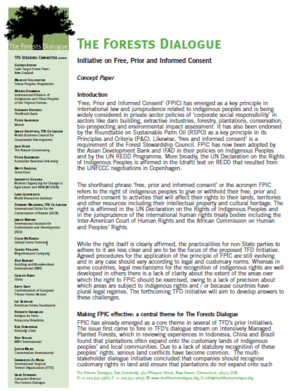Concept Paper on Free, Prior and Informed Consent
‘Free, Prior and Informed Consent’ (FPIC) has emerged as a key principle in
international law and jurisprudence related to indigenous peoples and is being
widely considered in private sector policies of ‘corporate social responsibility’ in
sectors like dam building, extractive industries, forestry, plantations, conservation,
bio-prospecting and environmental impact assessment. It has also been endorsed
by the Roundtable on Sustainable Palm Oil (RSPO) as a key principle in its
Principles and Criteria (P&C). Likewise, ‘free and informed consent’ is a
requirement of the Forest Stewardship Council. FPIC has now been adopted by
the Asian Development Bank and IFAD in their policies on Indigenous Peoples
and by the UN REDD Programme. More broadly, the UN Declaration on the Rights
of Indigenous Peoples is affirmed in the (draft) text on REDD that resulted from
the UNFCCC negotiations in Copenhagen.
The shorthand phrase ‘free, prior and informed consent’ or the acronym FPIC
refers to the right of indigenous peoples to give or withhold their free, prior and
informed consent to activities that will affect their rights to their lands, territories
and other resources including their intellectual property and cultural heritage. The
right is affirmed in the UN Declaration on the Rights of Indigenous Peoples and
in the jurisprudence of the international human rights treaty bodies including the
Inter-American Court of Human Rights and the African Commission on Human
and Peoples’ Rights.
While the right itself is clearly affirmed, the practicalities for non-State parties to
adhere to it are less clear and are to be the focus of the proposed TFD Initiative.
Agreed procedures for the application of the principle of FPIC are still evolving
and in any case should vary according to legal and customary norms. Whereas in
some countries, legal mechanisms for the recognition of indigenous rights are well
developed in others there is a lack of clarity about the extent of the areas over
which the right to FPIC should be exercised, owing to a lack of precision about
which areas are subject to indigenous rights and / or because countries have
plural legal regimes. The forthcoming TFD Initiative will aim to develop answers to
these challenges.

